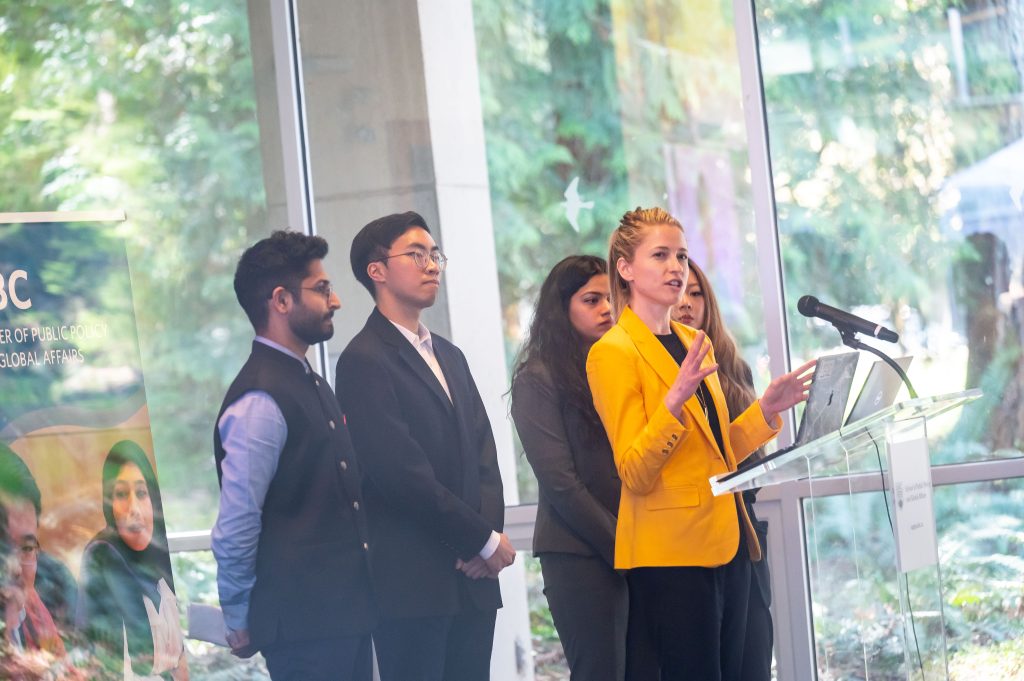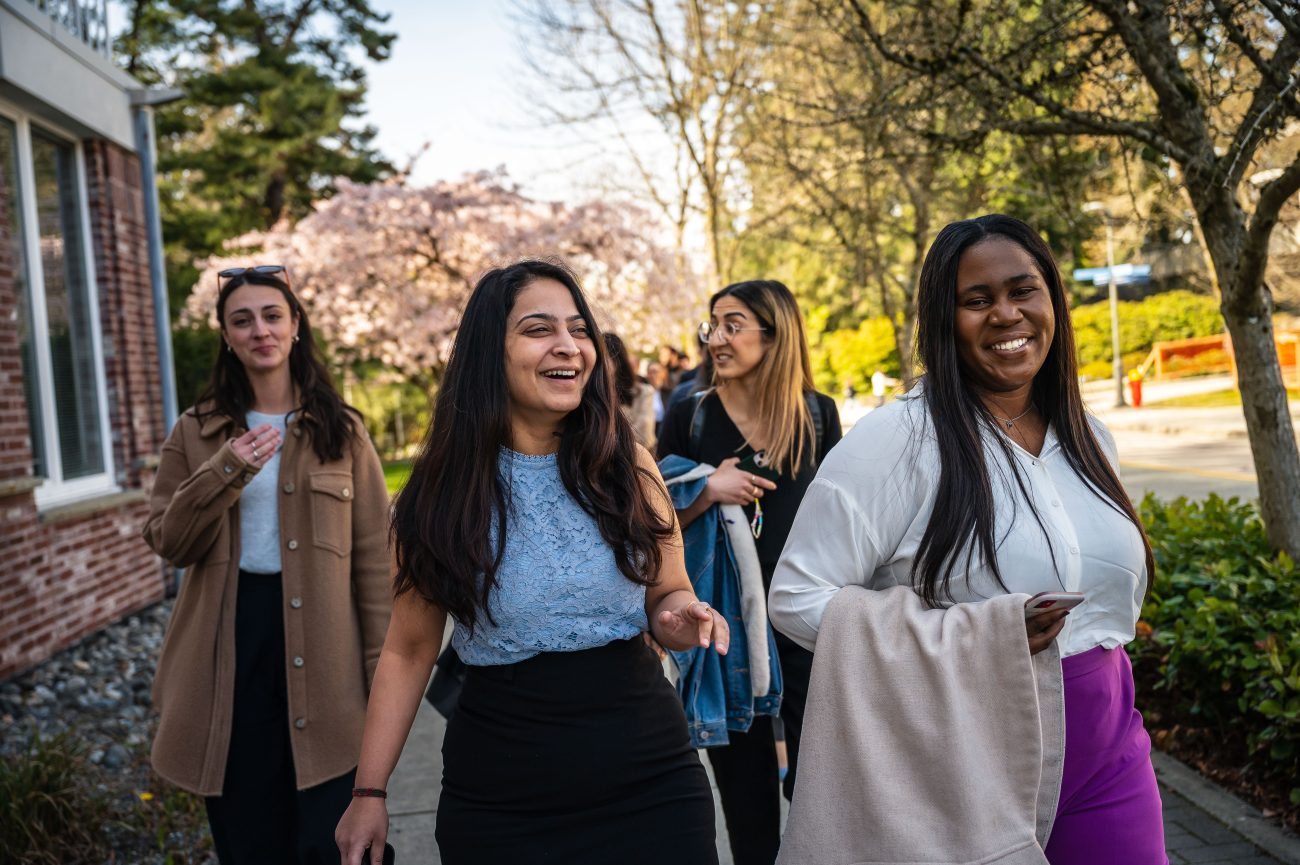The Global Policy Project (GP2) (PPGA 590), is a signature component of the professional Master of Public Policy and Global Affairs (MPPGA) program delivered by UBC’s School of Public Policy and Global Affairs (SPPGA). In these intensive capstone projects, student teams consult directly with a client organization to address a real-world policy challenge. Students apply their interdisciplinary backgrounds, creative thinking, and analytical skills to propose solutions.
Project Overview

GP2 is completed over the course of Year Two through a combination of lectures, Policy Studio sessions, and intensive stakeholder engagement. The project offers students an opportunity to apply methods and skills learned during the core courses taught during Year One. This includes policy research design, the strategic design process, and a variety of field research techniques.
Students will also regularly participate in a Policy Studio component throughout Year 2 to work on their Project. The Policy Studio is a flexible, visual learning space with a focus on collaborative experiences where students, faculty, and clients co-design experiments that integrate creative thinking with scientific methods in problem identification and analysis.
How it Works
- The MPPGA program identifies domestic and international clients through a rigorous selection process.
- Students work for an assigned client in a team under the guidance of a faculty member to complete each step of the Project.
- The client presents a specific policy challenge facing its organization, providing context to help students to understand and define the problem.
- To engage key stakeholders, international projects typically require a field visit in December to the client’s location. Please note that virtual fieldwork was conducted for 2020-2021 Global Policy Projects.
- Collaborating closely with the client and faculty in class and the field, the student team analyzes the problem, gathers data, and works through possible solutions.
- Students deliver a report and a policy brief to their client. They also present their findings and policy recommendations in a symposium held at the UBC School of Public Policy and Global Affairs at the end of Year Two.
Clients
We define clients as organizations engaged in activities that are significantly impacted by public policies. GP2 is an opportunity for students to understand the relationship between key stakeholders in the policy-making process and policy impact. Typically, they are organizations that work for stakeholders whose welfare depends significantly on state resources or regulations.
Clients may include:
- An institution supporting or implementing development programs;
- An interest group (trade union, associations etc);
- A think tank;
- An academic institution engaged in policy research;
- A government department;
- A multilateral institution; or,
- A social enterprise.
Clients provide an opportunity to integrate learning from core courses and acquire further field-based policy experiences. The interaction with a client and their stakeholders offers a chance for MPPGA students to integrate the theoretical and conceptual knowledge into a significant policy project with ideally both a research and a practice focus. This prepares students to be both policy research analysts and policy practitioners.
"For their Global Policy Project, UBC’s Master of Public Policy and Global Affairs students engaged for two consecutive years with the government of Ethiopia and the Canadian International Resources and Development Institute (CIRDI) / Support to Ministry of Mines Project (SUMM), funded by Global Affairs Canada. The student team developed ‘A Roadmap for Environmental and Social Impact Assessment in Ethiopia’s Mining Sector.’
The government and university partnership was built around co-design, co-delivery, and co-accountability. With the support of MPPGA students and professors, the project fostered innovation, collaboration, and inclusion that has reinforced the links between Canada and Ethiopia to create enabling conditions for the harmonious and sustainable development of the extractive sector.”
- Isabeau Vilandre, Esq., Director CIRDI-SUMM Project
“It was a real pleasure to work with the UBC MPPGA students. We were deeply impressed by the quality of their report that was based on thorough research and contained sharp analysis, but also by the students’ enthusiasm and commitment for the project.”
- Alix Vuillemin Grendel, Senior Advocacy Adviser, Women’s Initiatives for Gender Justice (WIGJ)
“I want to thank all of you, Tamara, Sanmini, Chengkun, and Andrés, and your faculty guides Professor Milind Kandlikar and Program Graduate Director Shashi Enarth, for choosing to do your MPPGA Capstone Project with us - Gram Gaurav Sanstha (GGS) and Rajiv Gandhi Institute of Contemporary Studies (RGICS). It was a learning experience for us too - the GGS team led by Jagdish and Sanjeev; and the RGICS team of Sanjeev, Jeet and Uzair. Most importantly, I think due to your visit, we gathered enough momentum to meet the Rajasthan State authorities at different levels and I hope this year there will be many more water conservation structures coming up in the area with public funds.”
- Vijay Mahajan, GGS/RGICS, India

"The UBC MPPGA students demonstrated the utmost professionalism and dedication. The team developed an assessment tool that will allow FTS and its partners globally to assess the degree to which the communities they work in are resistant to various forms of slavery."
- Kavi Ramburn, Evaluation Manager, Free the Slaves
“It was a pleasure working with the MPPGA students. Their interviews with senior business and government stakeholders across Canada and ASEAN helped uncover the Private Sector's mobility priorities. This improved understanding complements CABC’s efforts in advocating for closer economic ties.”
- Greg Ross, Executive Director, Canada-ASEAN Business Council
"The GP2 gives students the chance to learn country-specific knowledge while adapting to the local political and cultural contexts to resolve a policy problem. This provides them with a tangible policy experience to prepare for the workforce.”
- Shashi Enarth, former MPPGA Graduate Program Director